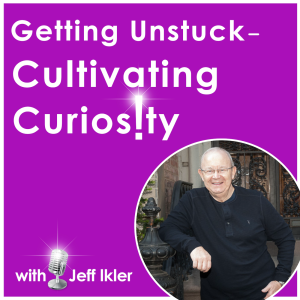
Getting Unstuck – Cultivating Curiosity
Education Podcasts
Curiosity sits at the intersection of creativity, effective human interactions, problem-solving and purposeful change. Unfortunately, the pace of life — at home, work, and school — often sidetracks our natural curiosity. So, let's see the familiar from a different angle or something new as a possibility to consider.
Location:
United States
Genres:
Education Podcasts
Description:
Curiosity sits at the intersection of creativity, effective human interactions, problem-solving and purposeful change. Unfortunately, the pace of life — at home, work, and school — often sidetracks our natural curiosity. So, let's see the familiar from a different angle or something new as a possibility to consider.
Language:
English
Website:
http://www.queticocoaching.com/
Email:
jeff@queticocoaching.com
401: How Do Writer Friendships Make the Creative Journey More Sustainable?
Duration:00:59:10
400: How Do Observing and Deep Listening Help Shape Strong Writing?
Duration:01:14:50
399: Why Do Public Lands Remain a Source of Controversy?
Duration:01:03:33
398: Why Do Internal Customers Matter as Much as External Ones?
Duration:00:43:23
397: Who and What's Behind the Continued Efforts to Sell or Transfer Our Public Lands?
Duration:00:58:16
396: What We Read and Why in 2025
Duration:00:05:13
395: Why Are Many of Today's Students Anxious, Aggressive, and Shut Down?
Duration:01:19:19
394: "Earthrise"—What Can the Apollo 8 Mission to the Moon in 1968 Still Teach Us?
Duration:00:15:49
Which Podcast Episodes Did You Listen to the Most in 2025?
Duration:00:10:18
392: In What Ways Do Children Grow When They Run Real Businesses?
Duration:00:36:07
391: What Can Chronic Uncertainty Teach Us About Control, Acceptance, and Resilience?
Duration:00:53:51
390: The Bureau of Land Management – Stewardship of Our Public Lands
Duration:00:57:33
389: In Life's Current—Where Curiosity, Connection, and Serendipity Converge
Duration:00:51:26
388: Bridging Our Virtual Distance: Reconnecting in the Age of AI
Duration:00:58:51
387: The Healing Power of Plants, Purpose, and Family
Duration:00:51:04
386: Walking Back to Ourselves: Lessons from the Camino de Santiago
Duration:00:47:04
385: Uncertainty and The Art of Paying Attention to Small Things
Duration:00:52:13
384: Beyond Test Scores: Four Pivots for Educational Leaders to Create Lasting Impact
Duration:00:43:09
383: Beyond the Catch—The Deeper Lessons of Fly Fishing
Duration:00:47:51
382: Rethinking the Purpose of Schooling—Preparing Adaptable Thinkers
Duration:00:59:16